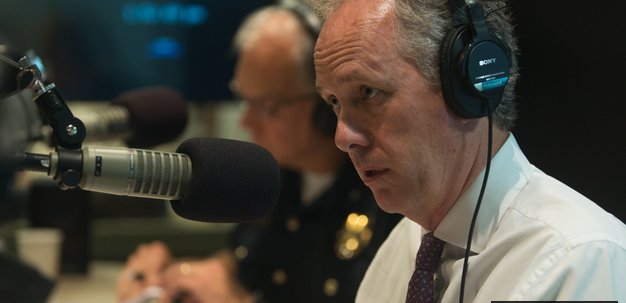August 10, 2018. WFPL.
Mayor Greg Fischer’s office has denied a follow-up meeting with a local faith-based group addressing police de-escalation tactics, saying there’s “no need” for a meeting with the mayor or his deputy.
Citizens of Louisville Organized and United Together (CLOUT) met with Mayor Fischer on June 22, alleging the Louisville Metro Police Department doesn’t enforce it’s own de-escalation policies when it interacts with mentally disabled and addicted people.
CLOUT asked for a follow-up meeting after that, but Louisville Deputy Mayor Ellen Hesen denied the request in a July 26 letter provided by CLOUT. In the letter, Hesen said the Mayor has full-confidence in the LMPD and recommended CLOUT meet with LMPD Chief Steve Conrad to air its grievances.
On Friday, Mayor’s spokesperson Jean Porter confirmed that the Mayor’s office denied CLOUT’S follow-up meeting request.
“While we appreciate your interest in this topic and the research you conducted, it appears some of the conclusions you have made are based on inaccurate assumptions,” Hesen’s letter said. “At this point, I do not believe there is a need for a meeting with the Mayor or me on these issues.”
CLOUT organized to address police de-escalation after two white LMPD officers fatally shot Darnell Wicker outside an apartment complex in 2016. He reportedly suffered from drug problems, and police said he came toward them wielding a handsaw. Wicker was shot 14 times.
A year later, LMPD released an 88-page report about its de-escalation tactics, claiming its ability to handle investigations is “greater than any external capacity.”
Porter said Mayor Fischer considers that review sufficient, and an external review was unnecessary.
CLOUT Co-President Reginald Barnes said the group was disappointed by Fischer’s denial of their request, adding they would continue asking for a meeting.
“We really believe that this is an important issue for all of Louisville, particularly our police officers and our most vulnerable citizens,” Barnes said. “We would hope that the Mayor would reconsider and understand that this is an important matter – that it does speak to transparency, it speaks to protecting all of our citizens as well as our police officers.”
Police De-escalation
Before CLOUT members met with Fischer on June 22, Barnes had requested police not be present. The group was also asking Fischer to launch an external review of LMPD policies and watch LMPD body camera footage of related incidents with the group.
Instead, Barnes said LMPD Chief Steve Conrad attended the meeting, and Fischer asked for six weeks to review the documents CLOUT brought.
In a letter sent to Fischer sent a week after the meeting, Barnes said Conrad’s presence stopped CLOUT from asking certain questions about LMPD.
Police de-escalation is largely handled by LMPD’s Crisis Intervention Team. These officers are trained in de-escalation techniques such as giving suspects space, speaking calmly and refraining from sudden moves.
Louisville police officers file around 2,000 crisis intervention-related reports every year, and are trained in CIT through a 40-hour course in the police academy. After that, training is offered yearly without a systematic reward system for de-escalating situations.
Professor Amy Watson, who researches crisis intervention team training at University of Illinois at Chicago, said the absence of such a system can indicate a department’s values regarding de-escalation and use of force.
Barnes, of CLOUT, said the group expects to mail a response to Fischer’s denial on Friday. Porter, Fischer’s spokesperson, said no further statement is expected from the Mayor’s office.
View original article.






